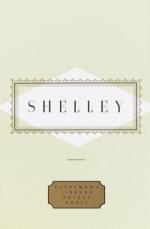...
This glorious clime, this firmament, whose lights
Dart mitigated influence through their veil
Of pale blue atmosphere; whose tears keep green
The pavement of this moist all-feeding earth;
40
This vaporous horizon, whose dim round
Is bastioned by the circumfluous sea,
Repelling invasion from the sacred towers,
Presses upon me like a dungeon’s grate,
A low dark roof, a damp and narrow wall.
45
The boundless universe
Becomes a cell too narrow for the soul
That owns no master; while the loathliest ward
Of this wide prison, England, is a nest
Of cradling peace built on the mountain tops,—
50
To which the eagle spirits of the free,
Which range through heaven and earth, and scorn the
storm
Of time, and gaze upon the light of truth,
Return to brood on thoughts that cannot die
And cannot be repelled.
55
Like eaglets floating in the heaven of time,
They soar above their quarry, and shall stoop
Through palaces and temples thunderproof.
NOTES: 13 rude 1870; wild 1824. 16-18
Beyond...priests 1870; omitted 1824. 25 Touched
1870; Tinged 1824. 34 To the poor 1870; Towards
the 1824. 38 their 1870; the 1824. 46 boundless
1870; mighty 1824. 48 owns no 1824; owns a 1870.
ward 1870; spot 1824. 50 cradling 1870; cradled
1824. 54, 55 Return...repelled 1870;
Return
to brood over the [ ] thoughts
That
cannot die, and may not he repelled 1824.
56-58 Like...thunderproof 1870; omitted 1824.
SCENE 5:
ARCHY:
I’ll go live under the ivy that overgrows the
terrace, and count the
tears shed on its old [roots?] as the [wind?] plays
the song of
’A widow bird sate mourning
Upon a wintry bough.’
5
[SINGS]
Heigho! the lark and the owl!
One flies the morning, and one lulls the night:—
Only the nightingale, poor fond soul,
Sings like the fool through darkness and light.
’A widow bird sate mourning for her love
10
Upon a wintry bough;
The frozen wind crept on above,
The freezing stream below.
There was no leaf upon the forest bare.
No flower upon the ground,
15
And little motion in the air
Except the mill-wheel’s sound.’
NOTE:
Scene 5. 1-9 I’ll...light 1870; omitted
1824.
***
THE TRIUMPH OF LIFE.
[Composed at Lerici on the Gulf of Spezzia in the spring and early summer of 1822—the poem on which Shelley was engaged at the time of his death. Published by Mrs. Shelley in the “Posthumous Poems” of 1824, pages 73-95. Several emendations, the result of Dr. Garnett’s examination of the Boscombe manuscript, were given to the world by Miss Mathilde Blind, “Westminster Review”, July, 1870. The poem was, of course, included in the “Poetical Works”, 1839, both editions. See Editor’s Notes.]




